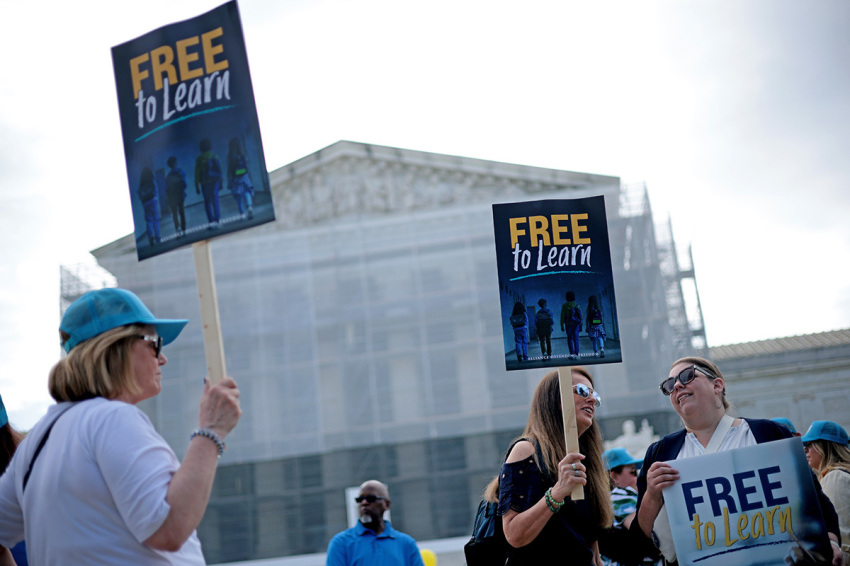Supreme Court hears arguments in Okla. taxpayer-funded Catholic charter school case
'Teaching religion as truth in public schools is not allowed,' argues Gregory Garre for Oklahoma

The United States Supreme Court on Wednesday heard oral arguments on whether Oklahoma can allow the creation of a taxpayer-funded online Catholic charter school.
The highest court in the land heard arguments in the combined cases of Oklahoma Charter School Board, et al. v. Drummond, Attorney General of Oklahoma and St. Isidore of Seville School v. Drummond, Attorney General of Oklahoma.
At issue is whether the state can contract with two Catholic Church regional bodies to operate a taxpayer-funded online charter school known as St. Isidore of Seville Catholic Virtual School.
Read Should religious charter schools be funded by public tax money?
Justice Amy Coney Barrett recused herself from the case. While she didn't give an explanation, The New York Times speculated that it had to do with Barrett being friends with Nicole Stelle Garnett, a professor who was an early adviser for St. Isidore.
Alliance Defending Freedom Chief Legal Counsel Jim Campbell argued on behalf of the charter school, saying in his opening remarks that “when a state creates a public program and invites private actors, it can’t exclude people or groups because they’re religious.”
“The Oklahoma Statewide Charter School Board is committed to this principle of religious neutrality,” said Campbell. “That’s why it approved St. Isidore’s application based on the strength of its proposal, refusing to reject the group because of its faith.”
Campbell took issue with the claim that the proposed charter school was “part of the government,” which the ADF attorney rejected, noting that it was “privately created by two Catholic organizations, and it is controlled by a privately selected board of directors.”
Justice Sonia Sotomayor asked a hypothetical about whether a charter school could, by the legal standard argued by Campbell, lawfully decide to no longer teach evolution in its science classes, compel students to attend mass or accept Catholic teaching.
Campbell responded that “St. Isidore allows exceptions for anyone that doesn’t want to attend mass” and “does not require students to affirm its religious beliefs.”
Regarding the other hypotheticals, Campbell said “the argument and the analysis would be different,” as this case was focused on the question of there being “any sectarian programming.”
Michael H. McGinley, an attorney representing St. Isidore’s, argued that the charter school was created by “private actors” and was therefore not a “government entity” to be held to the same standards as public schools.
Justice Elena Kagan asked McGinley about whether a Jewish Talmudic school that did little to teach state standards would have to be accepted by the charter school program by his reasoning.
McGinley replied that “a state doesn’t have to open up an educational program to private organizations” and that he was arguing that a state program cannot exclude a school solely because it is religious.
Gregory Garre represented Oklahoma Attorney General Gentner Drummond, who had filed a lawsuit against the state board for agreeing to greenlight the creation of the charter school.
Garre stated in his opening remarks that “charter schools are public schools” and thus have to be considered state actors that can be held to the same curricular standards as government schools.
“Teaching religion as truth in public schools is not allowed,” he said. “St. Isidore has made clear that that’s exactly what it wants to do in infusing its school day with the teachings of Jesus Christ.”
“Oklahoma respects and promotes through vouchers and other means the abilities of families to secure such an education in a private school.”
Garre emphasized the similarity between public schools and charter schools, including how Oklahoma’s charter schools and public schools, in accordance with state law, are both prohibited from teaching gender ideology or critical race theory.
Justice Samuel Alito asked about how charter schools are known to have more “flexibility” than public schools and to serve as a “real alternative” to them for students.
Garre conceded this, but then countered by noting that charter schools are “rigorously scrutinized” from when they present an application to when they hold classes.
Alito noted that while charter schools must have a curriculum that “has to meet certain state requirements,” their curriculum “can be quite different” in its “focus.”
In June 2023, the Oklahoma Statewide Virtual Charter School Board voted 3-2 to approve the creation of St. Isidore of Seville Catholic Virtual School. The school would be jointly overseen by the Roman Catholic Archdiocese of Oklahoma City and the Catholic Diocese of Tulsa.
However, progressive groups and Republican Attorney General Gentner Drummond objected to the charter school, with Drummond filing a complaint against the board in October 2023.
Progressive advocacy groups also filed suit. Defendants named in the complaint included the Statewide Virtual Charter School Board, individual board members, the Oklahoma Department of Education, State Superintendent of Public Instruction Ryan Walters and Saint Isidore of Seville Virtual Charter School, Inc.
In June of last year, the Oklahoma Supreme Court ruled 7-1 against the religious charter school, with the majority deciding that the approval of the entity ran afoul of the state constitution.
Although the charter school board unanimously voted to rescind the contract for St. Isidore per an order from the state Supreme Court, they also filed an appeal with the U.S. Supreme Court.
In January, the U.S. Supreme Court agreed to hear the combined cases of Oklahoma Charter School Board, et al. v. Drummond, Attorney General of Oklahoma and St. Isidore of Seville School v. Drummond, Attorney General of Oklahoma.



























